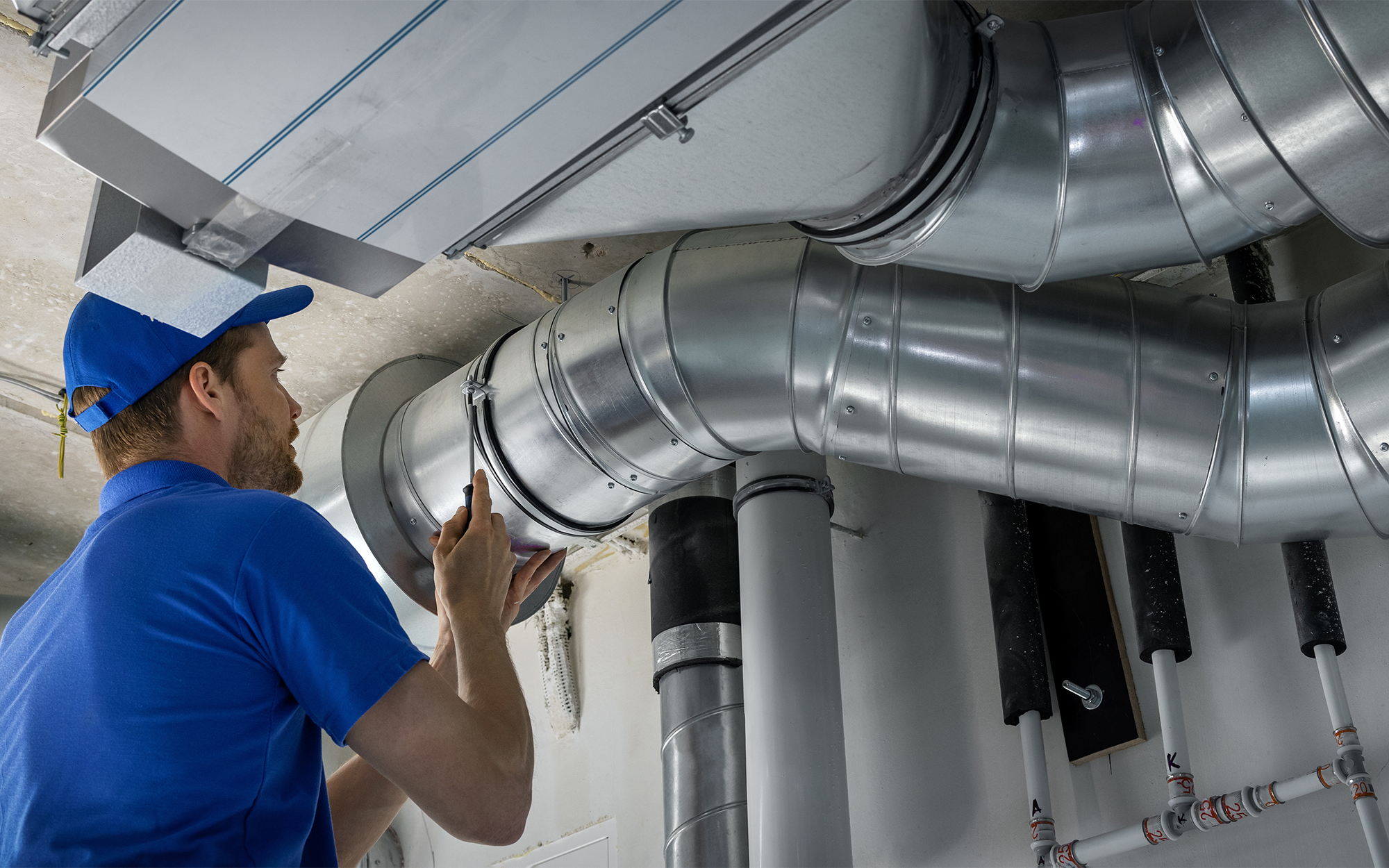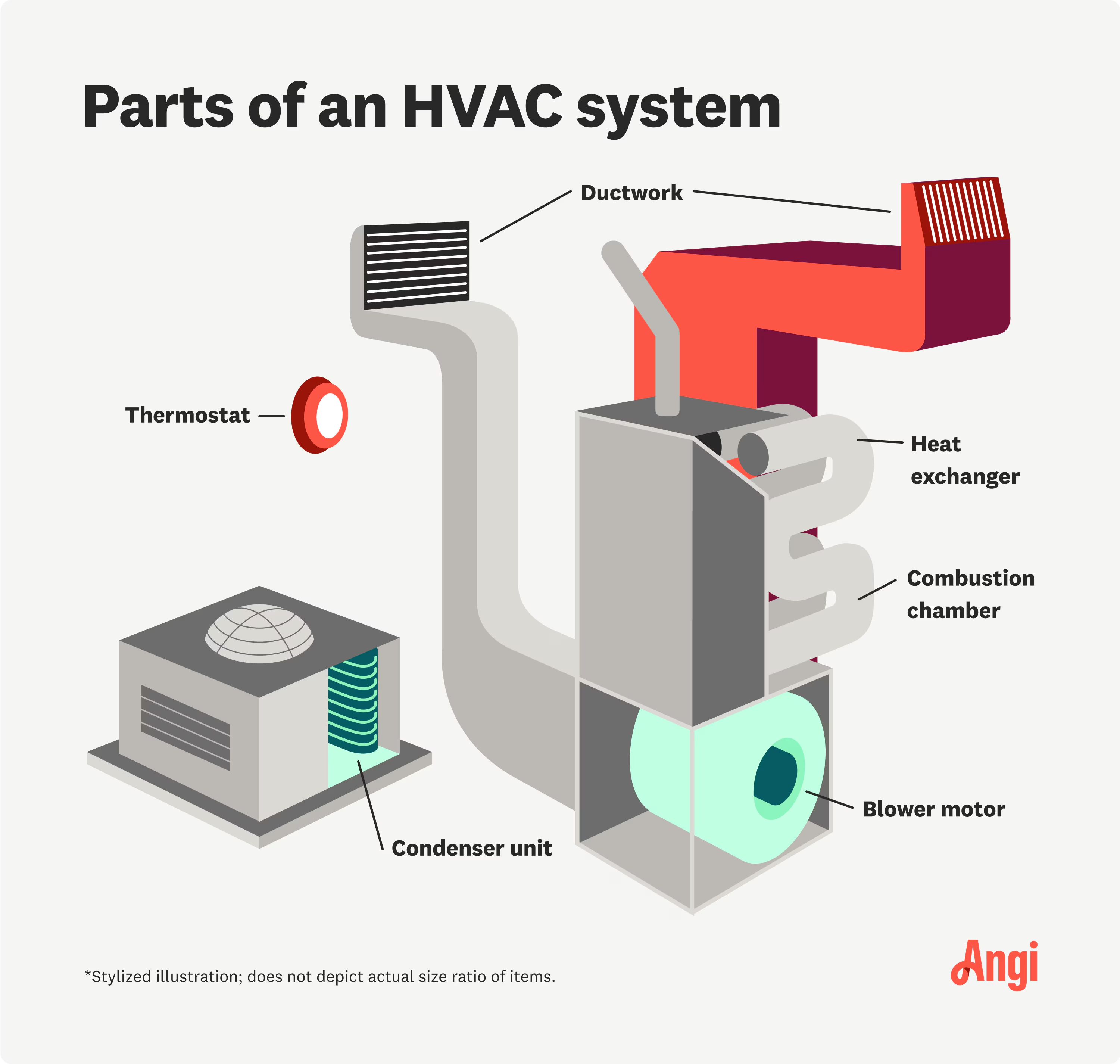See how HVAC experts provide reasonable comfort solutions for facilities
Wiki Article
Discovering the Important Parts of a Reliable Cooling And Heating System
An effective a/c system is developed on a number of crucial elements that operate in consistency. Each part, from the thermostat to the ductwork, plays an essential role in keeping comfort and power efficiency. Recognizing these elements is essential for maximizing efficiency and boosting indoor air top quality. As one takes a look at these elements, the complex partnerships in between them reveal insights right into boosting overall system effectiveness. What particular aspects contribute most to this efficiency?The Role of the Thermostat in Heating And Cooling Performance

Often forgotten, the thermostat plays an important role in the effectiveness of Cooling and heating systems. This tiny gadget works as the main nerve center, managing temperature setups and guaranteeing optimal comfort within a room. By properly noticing the ambient temperature level, the thermostat interacts with the heating, air, and ventilation conditioning systems to keep the desired climate
An efficient thermostat lessens power usage by activating the heating and cooling system just when necessary, thus stopping excessive heating or air conditioning. Modern smart and programmable thermostats enhance this effectiveness additionally by permitting users to establish timetables and remotely readjust settings, adapting to daily routines.
The placement of the thermostat is necessary; incorrect area can lead to imprecise temperature level readings, resulting in inefficient procedure. Overall, a well-functioning thermostat not only boosts comfort however also adds markedly to energy savings and the durability of the cooling and heating system.
Comprehending the Importance of Air Filters
Air filters offer an essential feature in a/c systems by ensuring that the air circulating within a space stays healthy and balanced and tidy. These filters trap dirt, allergens, and various other pollutants, stopping them from being recirculated throughout the environment. By recording these particles, air filters contribute to improved interior air high quality, which can significantly profit occupants' health and wellness, particularly those with allergic reactions or breathing problems.Furthermore, preserving tidy air filters boosts the effectiveness of heating and cooling systems. Clogged up filters can limit air flow, triggering the system to work tougher to keep wanted temperature levels, causing enhanced energy consumption and higher energy expenses. On a regular basis changing or cleansing filters is an essential maintenance action that can extend the lifespan of heating and cooling devices. Inevitably, comprehending the value of air filters permits homeowners and building supervisors to take proactive measures to assure a well-functioning, efficient a/c system that promotes a risk-free and comfortable interior atmosphere.

The Performance of the Heater and Warmth Pump
Furnaces and heatpump are critical components of heating and cooling systems, in charge of offering heat throughout chillier months. Heating systems run by heating air through combustion or electric resistance, then dispersing it throughout the home using air ducts. They commonly offer rapid home heating and can be fueled by natural gas, power, or oil, depending upon the system kind.Alternatively, warm pumps transfer warmth instead of generate it. They remove heat from the outdoors air or ground, also in reduced temperatures, and move it inside your home. HVAC experts. This double functionality enables heat pumps to also provide air conditioning in warmer months, making them versatile options for year-round environment control
Both systems call for correct upkeep to guarantee performance and longevity. While heating systems succeed in extreme cold, heatpump can be beneficial in modest climates. Understanding their unique capabilities help house owners in picking the most suitable option for their home heating needs.
Discovering the Air Conditioning Device
The cooling device is a crucial part of a/c systems, available in different types to suit different requirements. Comprehending the effectiveness ratings of these devices is vital for making notified options about energy usage and cost. This section will certainly discover the varied types of air conditioners and make clear exactly how effectiveness scores effect efficiency.Kinds of Air Conditioners
While numerous elements influence the option Get the facts of a/c systems, understanding the various types offered is vital for homeowners and structure managers alike. Central air conditioners are created to cool whole homes or buildings, using a network of air ducts for airflow. Home window systems provide a more localized option, suitable for solitary spaces or little spaces. Portable air conditioning unit give flexibility, enabling customers to move the device as needed. Ductless mini-split systems are an additional choice, integrating the performance of central systems with the convenience of zoning, as they require no ductwork. Geothermal systems harness the earth's temperature level for energy-efficient cooling. Each kind features distinct advantages, making informed choices necessary for efficient climate control.
Performance Rankings Discussed
Comprehending effectiveness rankings is important for selecting the best cooling device, as these metrics provide understanding into the system's efficiency and power consumption. The most usual ranking for a/c unit is the Seasonal Power Efficiency Ratio (SEER), which measures the cooling output throughout a common cooling period separated by the complete image source electric power input. A higher SEER suggests better performance. In addition, the Power Performance Proportion (EER) is utilized for gauging effectiveness under particular conditions. One more crucial metric is the Energy Star certification, which represents that a device satisfies rigorous power performance guidelines. By assessing these rankings, consumers can make educated selections that not only optimize convenience but also minimize power costs and environmental influence.The Significance of Ductwork and Airflow
Efficient ductwork layout and air movement administration play essential duties in the general efficiency and efficiency of heating and cooling systems. Correct ductwork guarantees that conditioned air is distributed equally throughout a room, reducing temperature variations and improving convenience. Well-designed air ducts reduce resistance to airflow, lowering the workload on HVAC tools and eventually decreasing power usage.Air flow monitoring involves purposefully placing vents and registers to improve the flow of air. This protects against typical problems such as chilly or warm places, which can happen when airflow is obstructed or inadequately well balanced. In addition, the best duct materials and insulation can better boost efficiency by lowering heat loss or gain during air transportation.
A reliable ductwork system not only adds to power cost savings however can likewise prolong the life-span of cooling and heating tools by reducing unneeded strain (HVAC experts). Subsequently, understanding the relevance of ductwork and air flow is necessary for achieving peak a/c system efficiency
Normal Maintenance Practices to Improve Efficiency
Normal upkeep methods are important for making certain peak performance of a/c systems. These techniques consist of regular inspections, cleaning, and needed repairs to keep the system running effectively. Consistently changing air filters is essential, as blocked filters can block air flow and decrease performance. In enhancement, professionals must check and tidy evaporator and condenser coils to stop overheating and power wastage.Annual professional assessments are also recommended, as experienced service technicians can determine possible issues before they rise. Lubricating relocating components lessens wear and tear, adding to a much longer more lifespan for the system. Moreover, ensuring that the thermostat functions appropriately help in keeping optimal temperature level control.

Frequently Asked Concerns
Exactly how Often Should I Change My Thermostat?
Thermostats need to generally be changed every 5 to ten years, relying on use and technology improvements. Regular checks are recommended to assure peak performance, specifically if experiencing inconsistent temperature level control or raised energy expenses.What Size Air Filter Is Ideal for My HVAC System?
The best dimension air filter for a heating and cooling system differs by system design. Typically, it's essential to speak with the proprietor's handbook or check the existing filter dimensions to ensure peak performance and air top quality.Can I Mount a Heatpump Myself?
Mounting a warmth pump individually is possible for experienced individuals, but it calls for understanding of local codes and electrical systems. Working with a specialist is advised to guarantee appropriate installment and suitable system performance.How Do I Know if My Ductwork Is Reliable?
To determine ductwork efficiency, one need to look for leaks, step air movement at vents, evaluate insulation top quality, and evaluate temperature level distinctions in between supply and return ducts. Professional assessments can provide complete insights into general performance.What Are Indications My A/c Requirements Immediate Upkeep?
Signs that a heating and cooling system needs instant maintenance consist of uncommon sounds, irregular temperatures, raised power expenses, undesirable odors, and constant cycling. Resolving these problems immediately can avoid more damage and warranty top system efficiency.Air filters serve an important feature in Cooling and heating systems by ensuring that the air flowing within a space remains tidy and healthy and balanced. Additionally, maintaining tidy air filters improves the efficiency of Cooling and heating systems. Ductless mini-split systems are another alternative, integrating the performance of main systems with the comfort of zoning, as they call for no ductwork. Comprehending efficiency rankings is important for selecting the appropriate air conditioning system, as these metrics provide insight into the system's performance and energy usage. The ideal size air filter for a HVAC system varies by unit design.
Report this wiki page